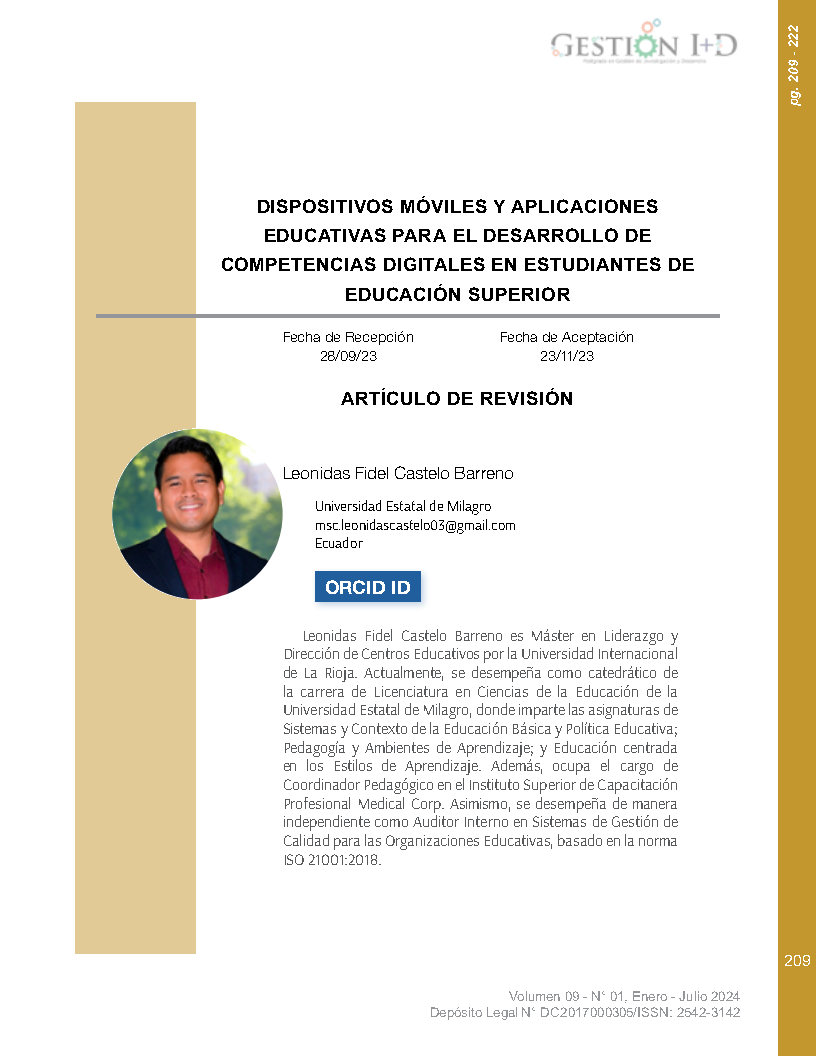Mobile Devices and Educational Apps for the Development of Digital Competencies in Higher Education Students
Keywords:
knowledge society, mobile devices, educational applications, pedagogical models, active learning methodologiesAbstract
The knowledge society has triggered significant transformations in higher education, influencing pedagogical models and how knowledge is imparted. This article explores the integration of various educational applications that strengthen learning through active methodologies. The objective was to establish links between educational applications and fundamental pedagogical models: behaviorism, constructivism, and connectivism. To achieve this, an analysis of the academic literature was carried out, the results of which highlight the relevance of integrating educational technologies and active methodologies to enhance learning in higher education. A change in teaching was found, influenced by the implementation of technological applications, which translates into greater reflection and critical analysis of the usefulness of mobile devices and educational applications from the perspective of the pedagogical models considered. This paper concludes by highlighting the importance of adapting teaching to the demands of the knowledge society, specifically improving higher education, focusing on the strategic implementation of mobile devices and educational applications
Downloads
References
Campbell, C., Tran, T.L.N. (2023). The 3C Merry-Go-Round: Constructivism, Cognitivism, Connectivism, Etc. In: Sankey, M.D., Huijser, H., Fitzgerald, R. (eds) Technology-Enhanced Learning and the Virtual University. University Development and Administration. Springer, Singapore. https://doi.org/10.1007/978-981-99-4170-4_12
Candia López, J. (2023). Competencias digitales en la educación superior. Horizontes Revista de Investigación en Ciencias de la Educación, 7(29), 1548-1563. https://doi.org/10.33996/revistahorizontes.v7i29.612
Cartelli, A. (2006). Teaching in the knowledge society: New skills and instruments for teachers. Information Science Pub. http://www.loc.gov/catdir/toc/ecip067/2006000269.html
Castells, M. (2011). The rise of the network society. John Wiley & Sons.
Czaplinski, I., Huijser, H. (2023). The Role and Application of Learning Theories in the Virtual University. In: Sankey, M.D., Huijser, H., Fitzgerald, R. (eds) Technology-Enhanced Learning and the Virtual University. University Development and Administration. Springer, Singapore. https://doi.org/10.1007/978-981-99-4170-4_13
Delgado Burgueño, A., Barraza Osuna, A., Quirino Rodríguez, L., Estrada Lizárraga, R., y Mendoza Tirado, D. (2022). Retos para integrar las TIC/TAC en la educación. South Florida Journal of Development, 3(6), 6544–6551. https://doi.org/10.46932/sfjdv3n6-013
Digón-Regueiro, P. e Iglesias-Amorín, F. (2022). Apps educativas para el público infantil: juegos para el entretenimiento o recursos educativos. Revista Colombiana de Educación, (84). https://doi.org/10.17227/rce.num84-12495
García, S. (2019). ¿Qué es el m-learning? ¿Es una opción viable para la educación del siglo XXI? https://observatorio.tec.mx/edu-news/que-es-mobile-learning/
Gutiérrez-de Piñeres Botero, C. (2019). Aplicaciones del eye tracking. Registro de movimientos oculares con el eye tracker Mobile eye XG (pp. 59-74). Editorial Universidad Católica de Colombia. https://repository.ucatolica.edu.co/entities/publication/6a71d776-b6f8-4dde-b05a-e1402fefdaa7
Marín Juarros, V., Moreno-García, J., y Negre Bennasar, F. (2012). Modelos educativos para la gestión de la información en educación superior: una experiencia de curación de contenidos como estrategia metodológica en el aula universitaria. Edutec. Revista Electrónica De Tecnología Educativa, (42), a218. https://doi.org/10.21556/edutec.2012.42.1
Ministerio de Educación del Ecuador (2021). Currículo priorizado con énfasis en competencias comunicacionales, matemáticas, digitales y socioemocionales. Nivel Bachillerato. https://educacion.gob.ec/wp-content/uploads/downloads/2022/03/Curriculo-con-enfasis-en-CC-CM-CD-CS_-Bachillerato.pdf
Pérez Zúñiga, R., Mercado Lozano, P., Martínez García, M., Mena Hernández, E., y Partida Ibarra, J. Ángel. (2018). La sociedad del conocimiento y la sociedad de la información como la piedra angular en la innovación tecnológica educativa. RIDE Revista Iberoamericana Para La Investigación Y El Desarrollo Educativo, 8(16), 847 - 870. https://doi.org/10.23913/ride.v8i16.371
Quishpe, C. y Vinueza, S. (2021). Diseño de una aplicación móvil educativa a través de app inventor para reforzar el proceso aprendizaje de operaciones con números enteros. Revista Cátedra. 4(2), 39-54. https://doi.org/10.29166/catedra.v4i2.2950
Salcines-Talledo, I., y González-Fernández, N. (2020). Aplicaciones Educativas en Educación Superior: Estudio sobre su uso en estudiantes y docentes. ENSAYOS. Revista De La Facultad De Educación De Albacete, 35(1), 15–30. https://doi.org/10.18239/ensayos.v35i1.1929
Sistema Nacional de Evaluación, Acreditación y Certificación de la Calidad Educativa del Perú. (2023). Nueva app “Sineace móvil”. https://www.gob.pe/institucion/sineace/campa%C3%B1as/25078-nueva-app-sineace-movil
UNESCO. (2012). Education and Skills for Inclusive and Sustainable Development beyond 2015: Think Piece for the United Nations Task Team on Post-2015 Development. https://www.un.org/millenniumgoals/pdf/Think%20Pieces/4_education.pdf
UNESCO. (2018). Las competencias digitales son esenciales para el empleo y la inclusión social. https://es.unesco.org/news/competencias-digitales-son-esenciales-empleo-y-inclusion-social
Vota, A. M. D. G. A., Gastelú, C. A. T., y Muñoz-Repiso, A. G. V. (2011). Competencias en Tecnologías de Información y Comunicación (TIC) de los estudiantes universitarios. Revista latina de comunicación social, (66), 1-26. https://www.redalyc.org/pdf/819/81921340018.pdf
Zambrano R., J. (2012). La docencia en la sociedad red: Apuntes para la formación de docencia virtual (Vol. I). Corporación para el Desarrollo de la Educación Universitaria.

Downloads
Published
How to Cite
Issue
Section
License
Copyright (c) 2024 Leonidas Fidel Castelo Barreno

This work is licensed under a Creative Commons Attribution-NonCommercial-NoDerivatives 4.0 International License.


